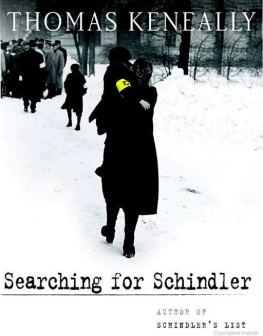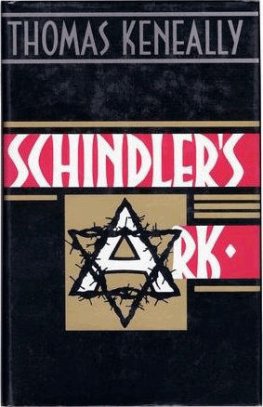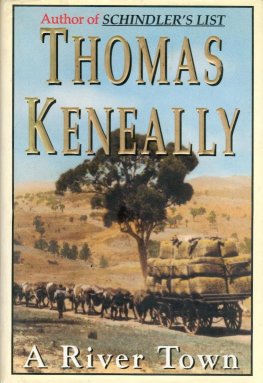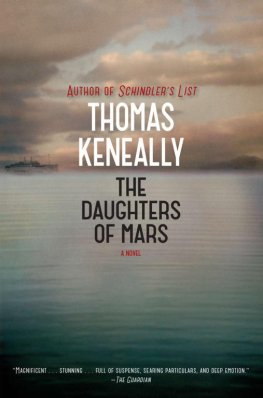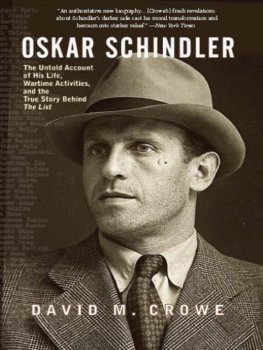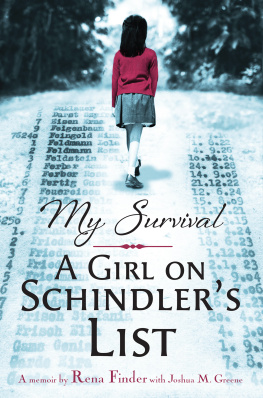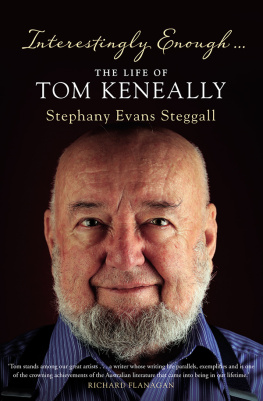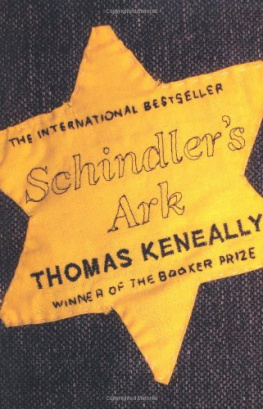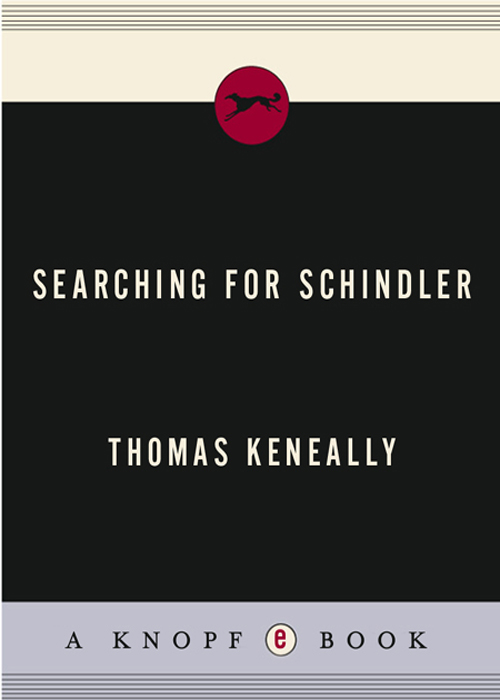
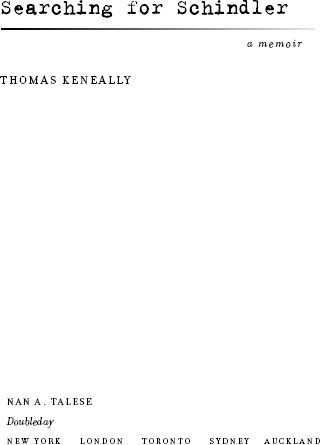
Contents
In memory of Leopold Page, 2001,
and to the continued health of Ludmila (Misia) Page
Authors Note
The author would like to thank Steven Spielberg for permission to use production stills taken on the set of Schindlers List, and Mrs. Misia Page for commenting on and correcting the manuscript.
T.K.
One
The Santa Ana winds blow down into the Los Angeles Basin from the north and northeast. They are torrents of air, starved for water in the deserts of Nevada and California. Racing to the sea over the Sierras, picking up heat, dust and spores as they fall, they flow through passes and canyons down into the basin of that great desert city, bringing with them a sense of displacement and filling the air with a strange, malign electricity.
It was late October of 1980, and for me the wind had a curiosity value, a little like an anecdotally useful experience of a slight earth tremor. The heat and bearing of the wind swept me along Wilshire Boulevard as I went out to shop, looking for a modestly priced briefcase in Beverly Hills, unsure that I was in a zone where such banal things were sold. Passing exorbitant Rodeo Drive on my left, one block from the hotel, I saw, stretching away south, a street that seemed to have normal shops, and family cars bearing the scuffs of suburban use. Malls had not yet subsumed the business of such centers as this, and people seemed to be busily parking and seeking out plain, useful human wares.
I had plenty of time to shop. My plane was not leaving for Sydney until the following night. In those days Australia was not a glamor destination, and only a few brave American space travelers joined us natives on the bi-or triweekly planes to the far southwest of the Pacific and my vast native continent, which many Americans still confused with Austria, and whose chief claim to international renown was the lambasting Germaine Greer gave its patriarchy in The Female Eunuch.
I had not gone far along the normal-looking street, South Beverly Drive, when opposite a Hamburger Haven I encountered a store named the Handbag Studio. Its goods looked out at me through the glass, out past banners which declared the Handbag Studios Fall Sale. On these placards, kid skin, cowhide, pigskin, snakeskin and crocodile were mentioned, but above all, discount percentages.
I hesitated, always a nervous shopper. But the shopkeeper soon appeared beside me, having stepped out from within. He had a stocky Slavic look and resembled the great character actor Theodore Bickela touch of Tartar in the cheeks, a barrel chest, powerful arms, a wrestlers neck. He wore a white shirt, a conservative tie and a good jacket with an Eagle Scout pin nested in its lapel. There was a glitter of fraternal amusement in his eyes. Even then, I believe I perceived that he had dealt in markets beyond my knowing.
He said, So its a hundred and five degrees out here and you dont want to come into my air-conditioned store. Do you think Ill eat you?
I was just looking for a briefcase, I said defensively.
I have the best, young man. Hong Kong and Italy. The best!
With these assurances, I let myself be led into the store, whichas he had promisedwas cool.
I have a good case, I told him earnestly.
My wife and daughters had given it to me. But one of its hinges had gone, and the other hinge was tearing too. The storekeeper respected my sentimental attachment to the old one, but pointed out that such harm was unlikely to befall what he was offering me. You just cant put everything in them. A truck? Theyre not a truck, you know! And his wide-set Tartar eyes glimmered.
He introduced me to his salesman, a man named Sol. They both had the same sort of Eastern European whimsy, but you could see at once Sols was of the melancholy rather than the exuberant strain.
As we chatted, the proprietor said, I must compliment you, sir, on your beautiful British accent.
Not British, I told him, with an automatic Fenian twitch imbued in me by Irish grandparents. Australian.
It was true and even fascinating that the Americans, largely ignorant of the bad odor in which our accent was held by the British, unconditionally liked our nearly vowelless English.
So then, he asked me, how did a gentleman like you bust your hinge?
I explained that Id been at a film festival in Sorrento in Italy.
The Sorrento gig arose from the revival of the Australian film industry in the early-to-mid 1970s, with directors such as Peter Weir, Bruce Beresford, Gillian Armstrong and Fred Schepisi. Since 1972 I had been associated, as friend and dabbler in film, with Schepisi, then a young Melbourne director, and had even acted in Schepisis first film, The Devils Playground, a far-above-average tale of Catholic childhood and, of course, emergent sexuality colliding with absolutist Catholic doctrine. By that northern autumn, Fred Schepisi had also made a novel of mine, The Chant of Jimmie Blacksmith, into a film. The book and film concerned an Aboriginal who in 1900 proceeded on an anti-white rampage in an Australia within whose Constitution, then in its final draft, all reference to the rights of Aboriginals was omitted. Id played a small part in that film as well, and since Fred Schepisi himself could not go to Sorrento for its biennial film festival, which was devoted that year to Australian cinema, I was invited to go as his stand-in.
They accommodated us in resort hotels along the Mediterranean coast, a festival load of people who had already established themselves and would go on to great renownBruce Beresford, the director; Barry Humphries, alias Dame Edna Everage; Judy Davis; Sam Neill; Bryan Brown; Ray Lawrence. We were still, both as a film industry and as a nation, unaccustomed to serious attention in northern European cultural centers, and enjoyed being the plat du jour.
The Italian press treated each film with a heady seriousness, and the showings left time for dining on sumptuous Neapolitan cuisine. But the Italians also gave us a massive amount of bumf on their industry. This load of serious documents was certainly not the sort of thing one would instantly throw away, unless one has grown worldly and weary of conferences. Indeed, I think the pages still exist in a storage box somewhere, a brown archive box unlikely to be opened by me in this life, and irrelevant to the next. The desire to fit in all the Italian material had busted the briefcase, one of its two hinges at the back coming away.
I told all this to the proprietor, who introduced himself as Leopold Page. I had not long been calling him Mr. Page when he told me he somewhat regretted the name. It had been foisted on him at Ellis Island in 1947, where he said they had scared him by telling him Americans couldnt pronounce his Polish name, but that if he wanted to change it later, it would cost him $500. He quickly invited me to call him Leopold; and then somehow, in a short time, I took to using the diminutive, Poldek. His true family name from Krakw, that beautiful Galician city, was Pfefferbergpepper mountain. I would come to think it a name that suited his exorbitant energy, his feisty goodwill.
Having been insistent to get me into his shop, Poldek seemed more curious about me than interested in a sale. This was scarcely an act. It would prove to be the way he was. Do you know some friends of mine? Poldek asked me. He mentioned various Eastern European names from Sydney and Melbourne. No, I hadnt had the honor of meeting these people, I said. Theyre Jewish friends of mine, he explained. From Krakw and other places. I explained that the Jewish community in Sydney, though substantial, was not as numerous as in Melbourne.
Next page


